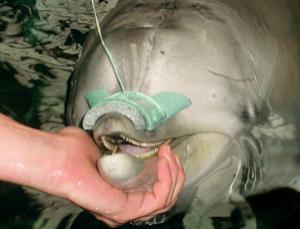摘要:对于圭亚那地区的海豚来说,只比其他动物多一种感觉还不够。除了回声定位能力以外,他们还能感觉到所捕食猎物的电场——这在真正的哺乳动物中还是第一次发现。相关论文发表于英国《皇家学会学报B》(Proceedings of the Royal Society B)。

海豚可感知猎物电场
德国罗斯托克大学的沃尔夫·汉克及其同事对热成像中所显现的圭亚那海豚上颌凹陷处密集的生理活动感到好奇。鱼类、有些两栖类以及像鸭嘴兽那种原始产蛋哺乳类动物,都会利用类似的凹陷处来捕捉附近动物产生的电场。
通过研究死亡海豚的结构,并训练一只活海豚对一个相当于鱼类产生的电场做出回应,研究小组发现,这些海豚也具有电场的觉察能力。
汉克表示:“电感知能力有利于在近距离内感觉到猎物的存在,因为此时回声定位感已不那么灵敏。”他认为,其他种类的海豚,甚至包括鲸,或许也有类似的天赋。他说:“绝大多数人都没有意识到鲸类也在海底捕食,因此,很可能它们采用的也是电场感应。”
汉克指出,电场感应器官是从古动物身上的须演变而来的。动物的这种机械性刺激感受器官,诸如人类耳朵里的毛细胞,能够机械性地发出触觉波或声波的激源。圭亚那地区海豚的这种感官适应性调节相当新奇,他怀疑“这种能力相对较容易演变,而且容易将机械性刺激感受器官演变为电场感受器”。
的确,这一研究结果表明,几乎所有的哺乳动物都有可能具有这种演变能力。
生物探索推荐英文原文报道:
Electric dolphins: cetaceans with a seventh sense
One extra sense isn't quite enough for Guiana dolphins. In addition to echolocation, they can sense the electric fields of their prey – the first time this has been seen in true mammals.
Wolf Hanke at the University of Rostock in Germany and colleagues were intrigued by thermal images showing intense physiological activity in the pits on the upper jaw of the dolphins, Sotalia guianensis. Fish, some amphibians and primitive egg-laying mammals such as the duck-billed platypus use similar pits to pick up electric fields generated by nearby animals.
By examining the structures in a dead dolphin, and training a live one to respond to an electric field comparable to that generated by a fish, the team showed that dolphins also have electro-sensory perception.
"Electroreception is good for sensing prey over short distances, where echolocation isn't so effective," says Hanke. Other species of dolphin, and even whales, may be similarly gifted, he says. "Most people don't realise that whales also feed on the floor of the ocean, so it is possible that they also use electrosensing."
Hanke points out that the electro-sensory organs are derived from whiskers in ancestral animals. These mechanoreceptor organs, like the hair cells in the human ear, mechanically transmit the stimulus of touch or sound waves. The adaptation in Guiana dolphins is fairly new, Hanke says, and he suspects that "it is relatively easy to evolve, to change mechanoreceptor organs into electroreceptors".
Indeed, the finding suggests nearly all mammals have at least the potential to evolve it too.







